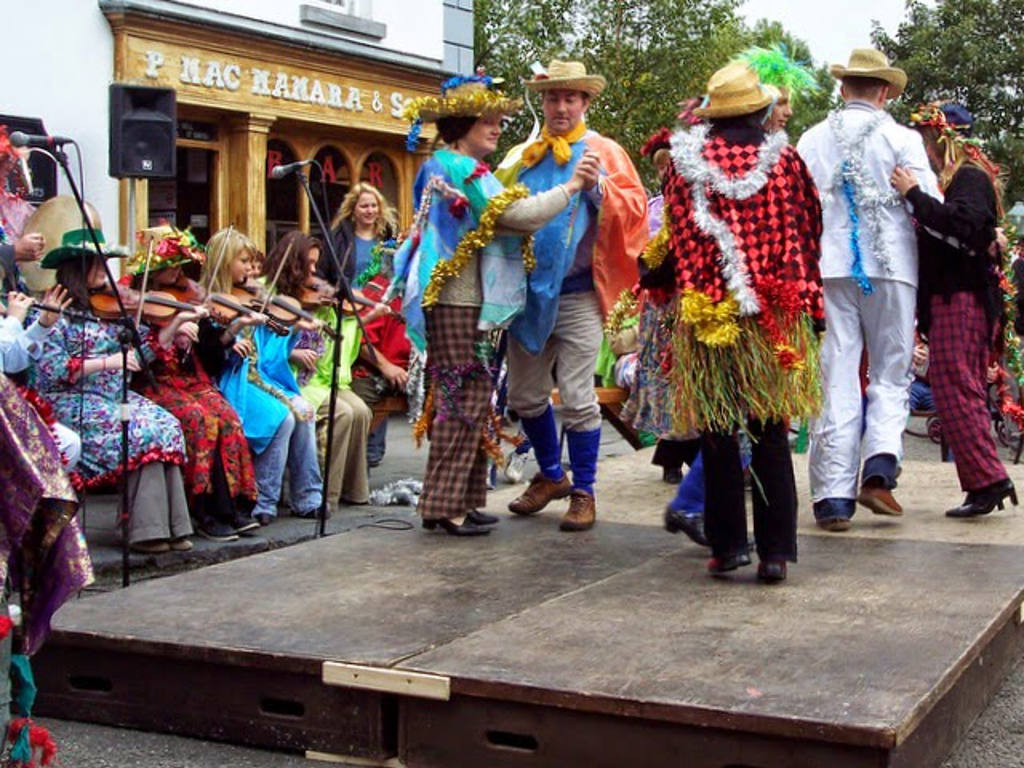
Christmas in Galway: The Wren Boys
“Hunting the Wren” on St. Stephen’s Day 🐦
With Christmas upon us would like to let you know about the annual tradition of ‘Hunting the Wran’ or the ‘Wren’ which is occurs in Ireland and throughout Galway at Christmas time. Once a common event throughout Ireland, it now takes place in certain towns and villages on St. Stephen’s Day, the day after Christmas Day, also known as ‘Lá an Dreoilín’.
Tradition of The Wren Boys 👨🌾
People dress up in old clothes and paint their faces, wear straw hats and travel from door to door singing, dancing and playing traditional music. Find out more about this very unusual age-old Irish Christmas custom…
Long ago in Ireland, young boys and men known as ‘The Wren Boys’ would go out into the woods. They would hunt for and then kill a wren and then parade the dead bird through the town on top of a decorated pole. Charming eh?
There is a lot of speculation as where this tradition stems from. One story says that long ago there was a plan by Irish soldiers to ambush a Viking soldier camp and a whole bunch of wrens pecked on the Viking soldiers drums and woke them up just in time for the plan to fail. The Irish soldiers were defeated. From then on, the wren was known as the bird of the devil.
The poor little Wren is also blamed for the betraying the Christian martyr St. Stephen when was in hiding by making noises, hence the reason for hunting the Wren on St. Stephen’s Day.
Of course, the little wren was considered the ‘King of all birds’ in Celtic mythology, as it is said that the birds had a contest to see who could fly the highest. The clever wren flew higher than the eagle by sitting on the eagles back as it soared high and then the wren could fly even higher when the eagle got tired. So this custom of hunting the wren could also stem from Pagan times.
In the old days it was a real wren that was killed and placed on the top of the pole and the “wren boys” would carry it around to houses and beg for money to bury the bird as it was considered to be evil.
The Wren Boys would sing this traditional song at each house 🎶
The Wran, the wran
the king of all Birds
on St. Stephen’s Day
it was caught in the furze,
up with the kettle
and down with the pan
give me a penny
to bury the wran.
The Wren Song
This ancient tradition can still be seen in certain towns and villages throughout County Galway, most notably with the New Inn Mummers Festival, and it really is a sight to behold! The Wren Boys march through the streets dressed in traditional attire (usually something made from straw) to the beat of drums and they stop off in bars along the way to play traditional music. Money is still collected but this is given to charity and of course a wren is not killed anymore but some Wren Boys march with a fake bird.
Outside of County Galway, if you happen to be in the south west of Ireland this Christmas then pop along to see this unusual celebration in the picturesque town of Dingle in County Kerry where it is very much alive. The Dingle Wren Festival draws spectators from great distances who come to take part in the fun, enjoy the music and the craic, or just to experience and see an age old Irish tradition that has been handed down through the years.
There are also Wren Day celebrations in Dublin on St. Stephen’s Day, which have become part of the annual festivities in the city. Musicians from all over come playing every kind of traditional instrument, like bodhrans, bagpipes and tinwhistles. The entertainment begins in Sandymount usually around 12 noon. The funds from this particular Wren celebration normally go to a local charity.
Actually, the famous Irish writer John B. Keane based his novel ‘The Bodhran Maker’ on the activities of the Wren Boys in his native County Kerry – it’s a really good read!
FAQs about Lá an Dreoilín/Wren Day in Ireland
What unusual tradition is associated with St. Stephen’s Day in Co. Galway?
On St. Stephen’s Day, December 26, a unique custom associated with the wren is observed in Co. Galway, Ireland. The day is commonly referred to as Wren Day, and it involves groups known as Wrenboys performing rituals related to the death by stoning of wrens.
What is the myth and legend surrounding the wren’s connection to St. Stephen?
According to the myth, a wren leaped out as other soldiers passed by, and it was discovered that St. Stephen was in the furze bush where the wren had been. St. Stephen cursed the wren, stating it would never be able to soar above a wall again. The tradition involves hunting down and symbolically stoning the wren to death, mirroring the fate of St. Stephen. Every year, roaming musicians dressed in disguises go door to door, treating the wren and performing in exchange for food, drink, and/or cash.
How is Wren Day celebrated in Co. Galway?
Wren Day in Co. Galway involves bands of musicians, known as Wrenboys, entering private and/or public homes door to door. They entertain the crowd through songs and performances, and in exchange, they receive food, drink, and/or cash. This tradition, thought to have originated hundreds of years ago, continues to be practiced, with the Wrenboys “hunting the wren” (pronounced “ran”) and maintaining the historical significance of the day.
